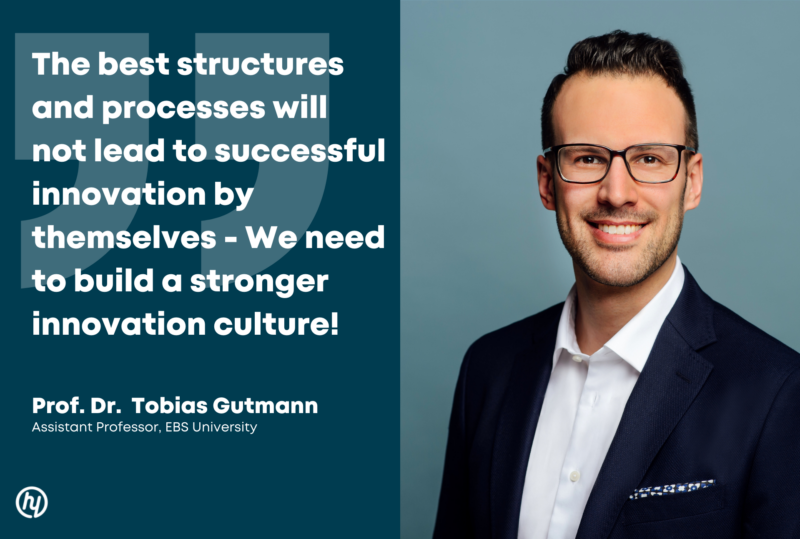4 Questions to Tobias Gutmann

Tobias Gutmann is assistant professor at EBS University, business advisor, and an expert in the area of innovation management, corporate venturing, and company building. He conducts a lot of research on those topics, combined with over a decade of industry experience.
Hi Tobias, great to have you as our guest today! You’ve worked in corporate innovation for several years, before diving into research full-time as an assistant professor at EBS University. Can you tell us a bit more about your most important research topics and what drives your research in general?
Originally, I have a technical background as an electrical engineer, which makes my research very technology-driven. I then worked in the industry for almost 10 years, inter alia at Siemens in the open innovation and corporate venturing space, where I was involved in one of the first innovation units in the German-speaking area (Technology to Business, or TTB, by Siemens). Further, I was in charge of several startup partnering projects and growth projects with our investment portfolio companies before I switched to academia full-time about one and a half years ago. Due to my background, passion, and past experience, I focus my research particularly on corporate innovation by strategically investigating how corporations manage to build the right things within innovation management activities, and how they build them properly within product development. In addition, I take a closer look at startup partnering and startup investments in the corporate innovation sphere to derive strategic recommendations for action.
What were the most concise findings from your scientific research so far – maybe things that haven’t been intuitive right away and thus, positively surprised or shaped you?
Since I do a lot of qualitative research to understand how companies drive innovation, I had many conversations with innovators from the startup and corporate sector. The radical openness of my interviewees has surprised and excited me ever since. As an outside researcher, I have the opportunity to immerse myself very deeply into the inner workings of what happens inside of corporations and get to know about the successes AND the failures or unsuccessful operations, without any reservation. In the beginning, I did not expect such profound insights and openness regarding the unsuccessful.
On a scientific level, the framework disclosed by Gartner (1986) in his paper “Venture Emergence”, has accompanied me for many years. Gartner describes four areas relevant for innovation and the creation of new ventures: Processes, organizational structure, the individual, and the environment. On the one hand, he mentions the “hard facts” of innovation such as processes and innovation structure, while on the other hand, he emphasizes the importance of the “soft factors” such as environment and the individual. As I am a typical management scholar, I normally advocate for the “hard”, measurable facts. Maybe this also links back to my engineering attitude. Nevertheless, it is always fascinating to see the relevance of these “soft factors” when it comes to successful innovation. Even the best structures and processes will not lead to successful innovation by themselves. If an organization hasn’t onboarded the right people, which are able to operate in a suitable environment, innovation initiatives are deemed to fail.
Let us now dig deeper into the corporate venturing space: What are the success factors to set up a well-functioning corporate venture unit? And who do you think is the most successful venture builder or incubator?
First, we have to actually define what venture building means. Due to the fact that it has no uniform definition, neither in business nor in academia, I will break corporate innovation down into its main parts for practice: building, investing, and partnering. For investing (corporate venture capital) you usually take on minority stakes in startups to pursue strategic and financial goals. Partnering can either imply venture clienting or acceleration. In case you partner without investing in an external startup, you do so to build something together on an eye-to-eye or client-relationship level. Last but not least, building implies the setup of a new business from scratch with your own resources or together with a partner. From my point of view, company building also implies new business building – while during the venture creation process, one has to decide how the new business should be pursued and where it’s domiciled. Does a spin-off make sense or should it be continued within the core business? To answer this and other strategic questions, it makes sense to define the strategic horizon. Within the process, you may answer different strategic questions such as how to maintain an unfair advantage while still differentiating yourself from the core business. To sum it up: Venture building is a complex endeavor and there is no one-size-fits-all approach. Just building and spinning off companies is the wrong thing to do! You need to review each project individually and determine what makes sense from a strategic perspective, if you should build from scratch or partner with others.
To determine the one most successful venture builder is very difficult because there are many different ones out there, ranging from large corporate company builders like Bosch or BP to smaller ones like Haniel or Viessmann. Moreover, you would need to define success in this area and then measure it accordingly. If, for instance, the KPI for success is happiness (and believe me, this was a real KPI as I found out during my interviews), an incubator may be successful, but from a C-Suite perspective things may look different. Hence, success is very much dependent on the KPIs being measured. So without a universal definition of success, there is no company builder that gets everything right.
However, when it comes to new business building in general, there are a few good examples out there such as the Otto Group. They did not opt for the pay-to-play principle with a broad portfolio, but rather took on great risk by building up “About You” as a new company to implement their future entrepreneurial vision. With About You, OTTO is not only a shareholder, but has utilized the knowledge spill-over in the best possible way to renew the core business from the outside-in. OTTO is further a really good example on how to drive mindset change and rebuild the company’s culture to renew itself. Coming back to the already mentioned importance of the “soft factors” culture and environment – We need to build more innovation culture!
At the beginning of the pandemic, many companies scaled down their investments and focused on themselves. Then in 2021, there was an explosion of ideas and liquidity and a lot of new businesses were created. What do you think, in which direction will innovation management head in the future?
On the one hand, I observed an adoption away from innovation theater towards a professionalization of innovation systems. This implies a consolidation of innovation units, especially in the corporate sector. I feel innovation management is becoming more professionalized and focused within organizations. On the other hand, the degree of openness concerning the fusion of open innovation and ecosystems is increasing. Innovation does no longer take place by itself, but it rather occurs in partnerships within ecosystems. My personal wish would be that there will be more collaborative partnerships, where innovation is open and happens in ecosystems. However, there are different opinions about this point: My co-author Henry Chesbrough from Berkeley (who coined the term Open Innovation back in 2003) recently mentioned at the World Open Innovation Conference (WOIC) that he is observing a decline in open innovation, for example in China. These developments are due to the Covid-pandemic and de-globalization. Conclusively, I would say that there will be certain parts in the world where we can observe a regression when it comes to open innovation, but this is definitely not the case in general. Last but not least, I see ESG and sustainability as the drivers for innovation in the future, because we really have to act as soon as possible in this field. The whole topic is not only “en vogue” currently, but you can really observe investors heavily focussing on it. Besides, VCs are already applying ESG clauses and there are strong investments into ESG topics in the deep tech sector happening, which is a clear indicator for the future.


